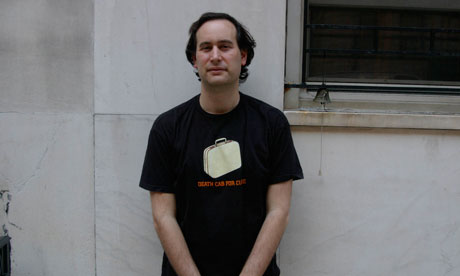
Time was buying a book as a romantic gift was easy – a copy, preferably secondhand, of Raymond Carver's collected stories and you were home free. But now publishers are actively promoting the Valentine's Day book and it feels like murky waters indeed, beset with potential hurts and slights.
The Lover's Dictionary, the first proper adult novel from American young adult author David Levithan, is the story of a relationship gone awry. He is a fairly straight, solid, possibly slightly geeky type from a functional, loving background. She is chaotic and charismatic, has a drinking habit that changes her from charming to aggressive, and is unable to believe that relationships don't end as messily as her parents' did. They meet on an internet dating site ("I noticed on your profile that you said you loved Charlotte's Web. So it was something we talked about on that first date, about how the word radiant sealed it for both of us"). They move from counting their relationship in dates to months, and find an apartment together ("I was the one who said we should live together. And even as I was doing it, I knew this would mean that I would be the one to blame if it all went wrong"). They meet each other's families ("the meeting of the rivers"). And all the time he is picking her up and dusting her down, forgiving her drunken behaviour ("From now on you are only allowed one drink at any of my office parties"), enduring her petty barbs ("There is no reason to make fun of me for flossing twice a day"), and then finally trying to pick up the pieces of their relationship in the wake of her infidelity.
So far, so normal. Boy meets girl and they negotiate pitfalls of union. But in reimagining the age-old story, Levithan has dispensed with chronology and written it in dictionary entries, moving step by step through the alphabet. The broken up time scheme works. Just as you are enjoying the intoxicating dance of their descent into love, you are met face to face with infidelity and the pain of the fallout. So "brash, adj. I want you to spend the night" is followed by "breach, n. I didn't want to know who he was, or what you did, or that it didn't mean anything."
Like all the good love stories, this one is both unique and universal: it's impossible not to nod along in recognition. For all the cutesiness of the form, it is a refreshingly grown-up story of a love affair between adults who should know better but haven't learned a damn thing. Levithan is a generous, warm-hearted writer, and his conceit feels original, a brave way of articulating the fictions we create for ourselves in relationships. It also allows for a nice slant on the absurdity of it all. Under "love, n?" he simply writes: "I'm not even going to try."
The definition of "ineffable, adj." reads, "Trying to write about love is ultimately like trying to have a dictionary represent life. No matter how many words there are, there will never be enough." Indeed, and maybe the most articulate thought in the novel is one rage-filled entry (under "catharsis, n."): "YOU FUCKER, I LOVE YOU." A Valentine's Day gift? What could be better…

